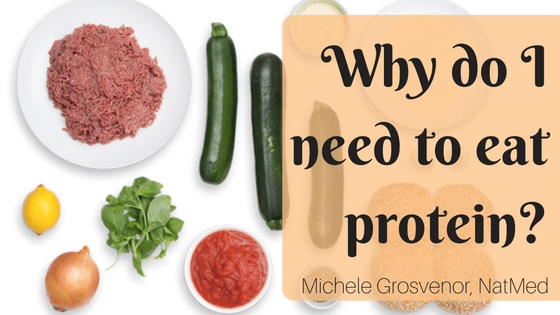
14 Oct Why do I need to eat protein?
Why do I need to consume adequate protein?
This is one of the conversations I often have with clients as the majority of people aren’t consuming enough.
After water, protein is the second most abundant component found in the body and it is vital for
- growth,
- repair and
- maintenance.
It acts as a structural unit and is present in every cell, organ and tissue. Some essential uses for protein in the body include →
- It is a precursor for neurotransmitter production
e.g. dopamine and serotonin – which are used for healthy nerve and brain function. - It is used for hormone production to transport important messages to and from our cells
e.g. thyroxine - For enzyme production which regulates metabolic activities
e.g. digestion - To support the immune system by making antibodies that protect us from disease.
- For maintaining the fluid balance between capillaries and cells, through plasma proteins which control nutrient and waste exchange.
- For pH regulation of your blood and tissues – decreased protein intake can affect your acid/alkaline balance which can promote disease.
- To provide an alternative energy source when carbohydrate stores are low.
What are proteins?
Proteins are a combination of structural units called amino acids. These units are the building blocks for the body and are required in certain quantities and ratios. Some of these amino acids can be produced by the body but some can’t, and are therefore required in the diet to meet metabolic demand. The amount of amino acids present in a protein determines its nutritional value, and can vary from food to food. Animal products contain all essential amino acids, whereas most plant foods don’t and need to be combined with other foods to meet daily protein requirements.
How much do I need each day?
It is important for optimal health, to consume an adequate amount of protein each day.
For every kilogram you weigh, you need to consume 1 gram of pure protein → Therefore, if you weigh 70kg you need 70gms in total of good quality protein per day.
→ An additional 25gm/day is recommended in pregnancy and lactation, with children requiring differing quantities depending on their age and growth patterns.
CLICK HERE to view a list of good quality proteins!

The size and thickness of your individual palm can be used as a rough measure. Consuming 1/3 protein (a palm size) to 2/3 carbohydrates in every meal, ensures your daily protein intake is covered.
Protein boosts your metabolism!
Another important role for protein is to boost metabolism, and should be included if you are wanting to lose any extra kilos. Studies have shown that consuming a high-protein meal can raise metabolic rates by 25%, whereas a high-carbohydrate meal only increased metabolic rate by 5%. Protein based meals are also more satisfying and help to make you feel full. That is why protein powders are often part of a weight loss program and can be used as an additional way to increase your protein consumption if you are falling short.
So the next time you are serving up a meal consider if you have had your protein quota for the day!
Want more support for your diet or overall health?
Call 9339 1999 to book in a consultation with Michele Grosvenor now.
